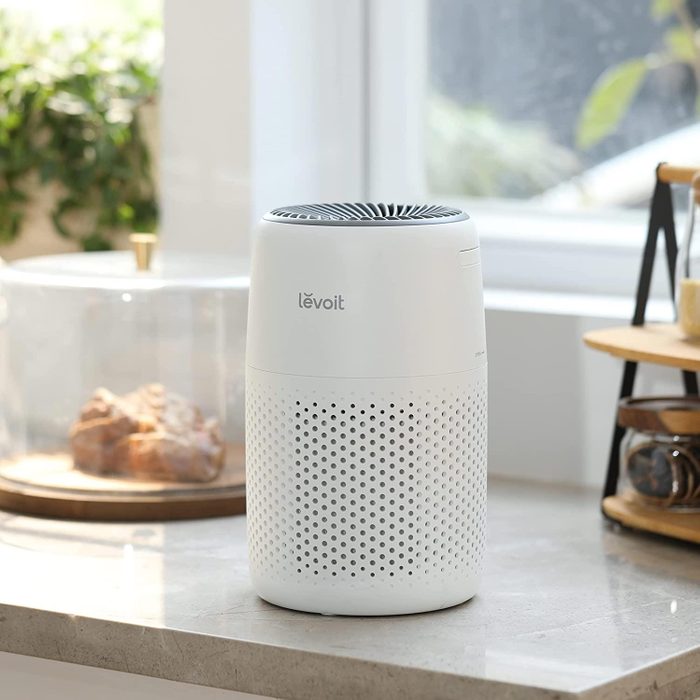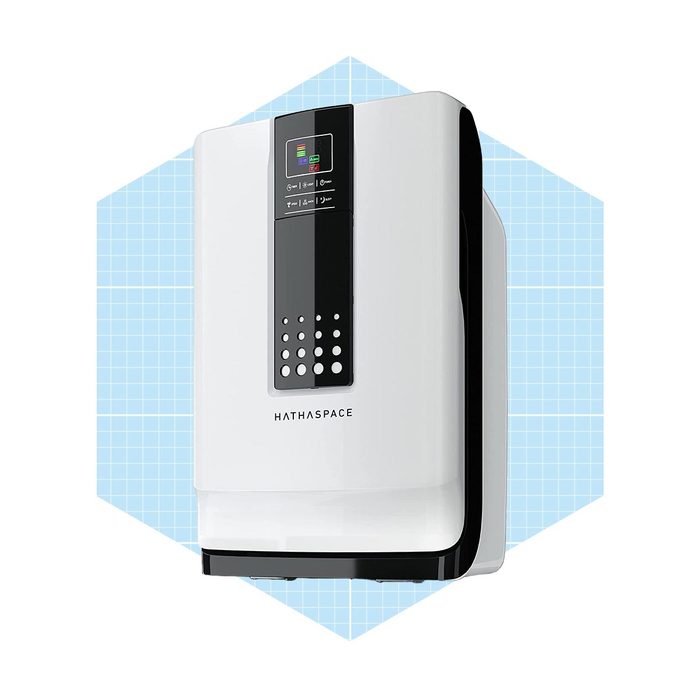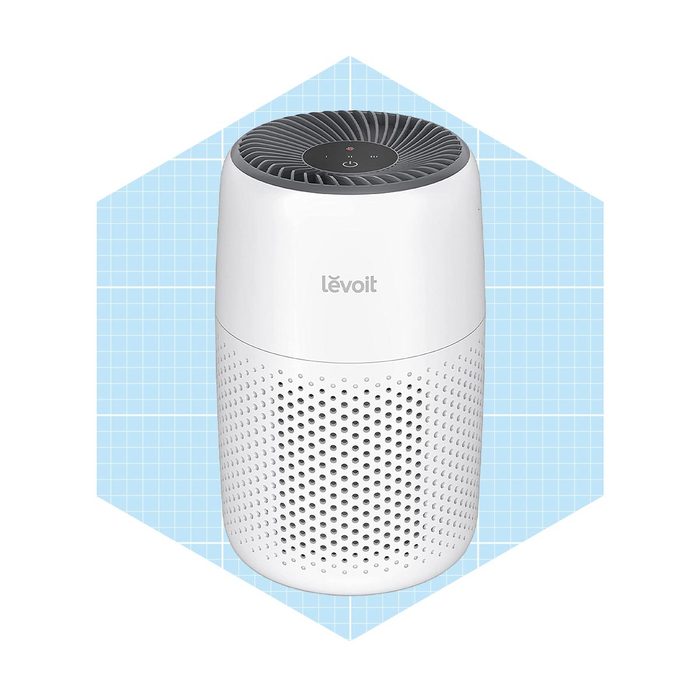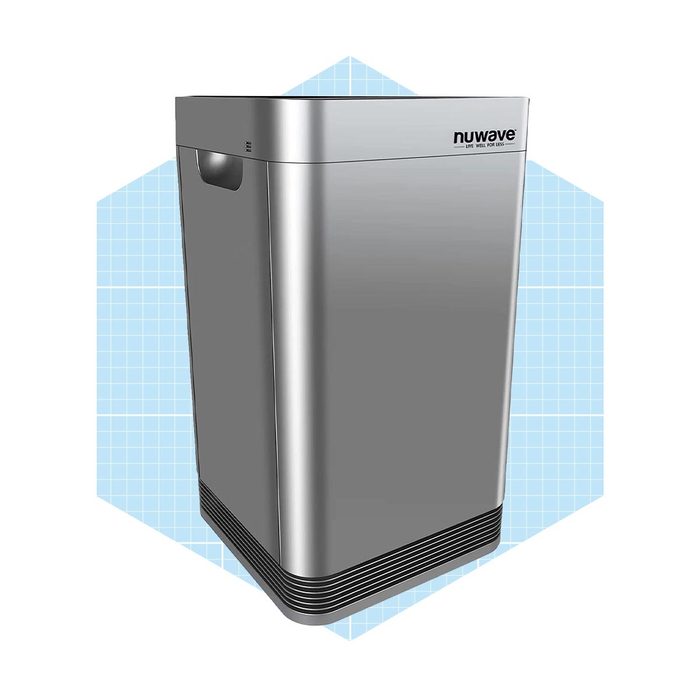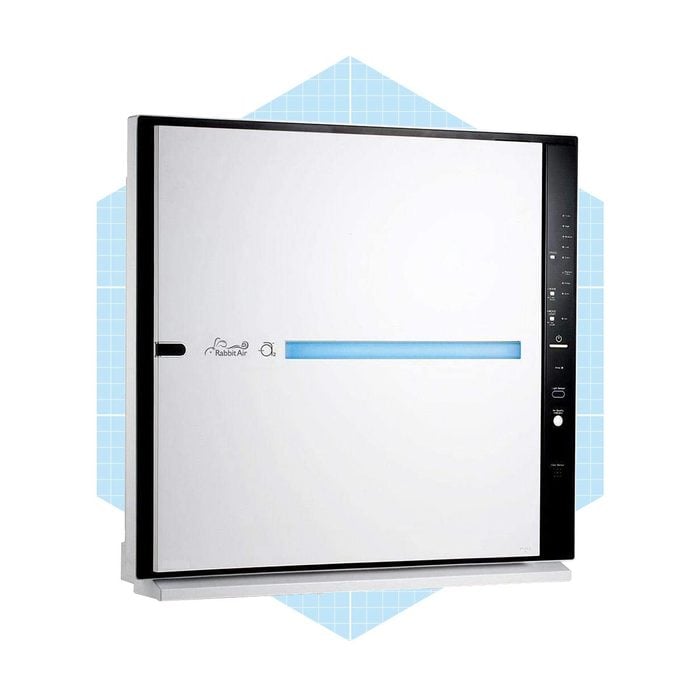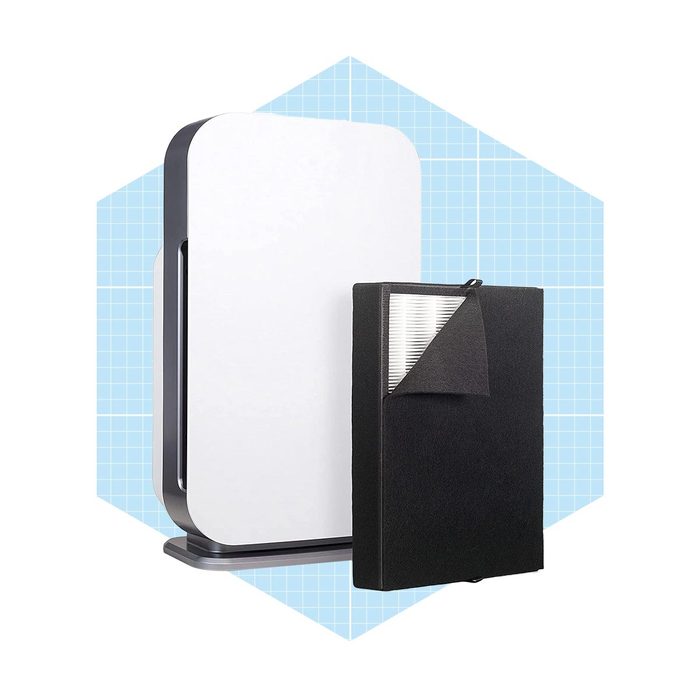Best Overall Basement Air Purifier
Hathaspace Smart Air Purifier
This five-in-one air purifier filtration system removes particles as small as 0.3 microns while also eliminating 99% of smoke. Equipped with a four-stage HEPA filter, the Hathaspace does a number on dust and allergens, pet hair and dander, smoke, VOCs, viruses, bacteria and musty odors—effectively cleaning up to 700 square feet of air per hour. We also love how the freestanding unit’s slim profile means you can lean it up against a wall or on a counter so it’s out from underfoot.
Pros
- Sensor detects pollutants and adjusts fan speed accordingly
- Built-in, energy-saving sleep mode
- Air quality feedback display
- Remote control
- More than 11,000 five-star reviews on Amazon
Cons
- Produces small amounts of ozone when ionizer feature is turned on
Best Budget Basement Air Purifier
Levoit Core Mini Air Purifier
Founded in 2017, this woman-owned company wins our pick for best basement air purifier on a budget. The Levoit Core Mini is an exceptional value, but it’s also incredibly minimalist and uncomplicated in the best possible way. It fits on a shelf or tucks inconspicuously into a corner, making it the top option for dusty basements less than 200 square feet.
The Levoit purifier features a 360-degree air intake to guarantee clean air is circulated throughout the room. But what makes this product really special: essential oils can be added to the diffuser pad to eliminate basement odors and keep your stuffy space smelling sweet and fresh.
Pros
- Costs less than $50
- Travel-friendly (weighs less than four pounds)
- Comes in white, cream or dark black
Cons
- Power cord is short
Best Basement Air Purifier for Large Rooms
Nuwave OxyPure Pro Air Purifier
Say hello to an air-purifying device with big power—up to a whopping 2,671 square feet per hour of purifying power, to be exact! That’s why the Nuwave OxyPure is the best pick for large basements. It’s also incredibly mobile, with four wheels to roll around the basement, or you can grab it by the ergonomic handle to easily carry it up and down the stairs. Never-rust stainless steel filters are washable and reusable for up to 20 years.
Of the thousands of satisfied shoppers, one happy Amazon customer writes: “So amazing how it senses changes in the air and automatically makes adjustments to clean the air of dust and odor. My wife was using fingernail polish in a different room a long distance from our purifier. It sensed the odor and ramped up the airspeed to eliminate the odor. Amazing. High priced, but you get what you pay for.”
Pros
- Purifies up to 2,671 square feet within one hour
- Six-timer settings with auto shutoff
- Wi-Fi capabilities gives you remote control
- Washable air filters eliminates costly replacements
Cons
- Expensive
Quietest Basement Air Purifier
Rabbit Air Minus Air Purifier
The Rabbit Air Purifier is not only sleek, smart and stylish, but it’s also nearly silent. This is thanks to the five-speed state-of-the-art brushless motor, with a noise range starting at a hushed 20.8 dBA. It’s equipped with six stages of replaceable filters to absorb all types of toxins. The lightweight unit is designed to sit on a desk, stand alone on the floor or mount to a wall.
The flexible placement options make it particularly helpful if you’re low on space or remodeling a basement. There’s even a purple mood light that allows you to control the ambient light, and a customizable front panel to add images by the likes of Monet, Van Gough or Hello Kitty.
Pros
- Motor sound is barely detectable at the highest speed
- Zero ozone emissions
- Five-year warranty
- Wi-Fi enabled
Cons
- The air quality indicator light is bright and can’t be disabled
Best Basement Air Purifier for Allergies
Alen FlexAir Purifier
Pollen and allergens are no match for the Alen FlexAir Purifier. Developed by airflow engineers at NASA, the BreatheSmart Flex Pure Filter captures 99.99% of airborne particles that trigger allergies. Perfect for any earthly space—from small to extra-large basements—as well as bathrooms, bedrooms, living rooms, offices, nurseries and kitchens.
Verified Amazon customer Paige Tyler says she purchased the FlexAir because she was experiencing allergy symptoms, but only at night and in her own home. “After two days of full-time usage, I was able to breathe at night without the use of Afrin nose spray. When the sun peeped through our windows, the air was no longer filled with dust particles,” she writes. She calls it a “complete game changer” adding, “I would highly recommend it to anyone suffering sinus congestion on a regular basis.”
Pros
- Includes a filter that specifically helps capture asthma and allergy triggers
- SleepScore validated (93% of study participants had improved sleep quality)
- Has the size and look of a modem
- Energy Star-certified
Cons
- Some reviews say the high-fan setting is loud
- Replacement filters are pricey
What to Consider When Buying a Basement Air Purifier
In order to find the best basement air purifier, the first thing to consider is the size and dimensions of your space. Next, do a “sniff test” to help determine if you might have mold. If so, a basement air purifier with a good HEPA filtration system is recommended. Another option for the best air purifier for mold in a basement is to seek out a unit with a UV-C Light feature, which is known to kill germs and mold spores as well.
How We Chose the Best Basement Air Purifier
As shopping experts, our only job is to help you find a winning product. We start with the research and reporting basics—what products are made of, what they look like and how much they cost—to ensure that we’re only recommending the buys that are worth your time and money. Then, we research the features that speak to the product’s quality, taking advice from industry insiders and subject matter experts on what makes a product a smart value (or worthy of a splurge). Finally, we do the work of combing through user reviews to see how real people interact with the product, and if it stands up to the test.
FAQs
How do air purifiers work?
Air purifiers are electronic devices that sanitize air to remove impurities and pollutants. They work by using a fan to suck air in and send it through one or more filters. The filters capture and neutralize the particles as they pass, pushing the clean air back out into the living space. Additionally, some have ionizers to help improve air quality.
What’s the difference between an air purifier and a dehumidifier?
Air purifiers do just that: purify the air. Dehumidifiers, on the other hand, draw humidity out of the air. Drying up a moist basement suppresses the growth of unhealthy mold and discourages bugs such as silverfish, cockroaches and spiders from moving in.
Do air purifiers work for removing smell and mold in basements?
Does your basement have disagreeable household odors? To stamp out bad smells, a basement air purifier with a carbon filter is a must.
Shop smarter with our expert recommendations for tools, gear and money-saving deals on can’t miss DIY and home products. Sign up for the Stuff We Love newsletter.

